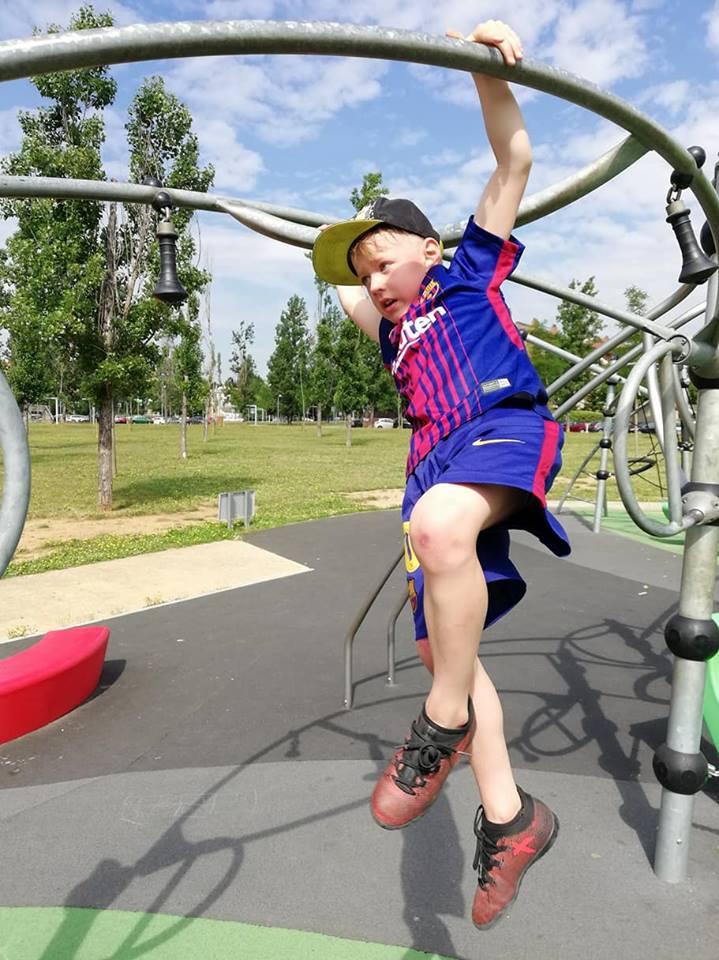Young children’s daily living environment and motor skills are closely related in the Finnish context

Credit: Martta Walker / University of Jyväskylä.
In a recent study with 3 to 7-year-old children provided an example of how children’s daily living environment and motor skills are closely related in the Finnish context. The main finding revealed that residential density is related to children’s motor skills, engagement in outdoor play and organised sports. It was found that Finnish children living in the countryside spent more time outdoors and had better motor skills than their age peers in the metropolitan area. On the other hand, children living in the metropolitan area participated the most in organised sports.
Motor skills comprise locomotor, object control and balance skills, all of which are present in everyday life tasks like running, climbing and drawing. Adequate motor skills enable participation in typical games and plays for different ages and developmental phases, for example, in running and ball games.
– In early childhood, the mastery of basic motor skills is one of the main developmental task of the child. Motor skills enable children to participate in various physical activities and physically active play. Mutual plays and games enable children to have friends to play with. Moreover, motor skills are also crucial when it comes to school adaptation, says PhD. student Donna Niemistö from the Faculty of Sport and Health Sciences, University of Jyväskylä.
Motor skills do not develop to an optimal level without practising. So far, we know that one out of ten children have delays in their motor development. These delays can complicate everyday tasks, such as putting clothes on, writing and riding a bike.
– Every child, with or without delays in motor skills, develops motor skills through repetition of the task. For the child’s development, it is crucial that (s)he has an opportunity to try, play and practise spontaneously. The parental presence while moving assures the child that practising motor skills is important and safe. Therefore, for example, summertime is an excellent period to move as a family, as nature enables versatile experiences and stimuli for the child’s motor development, explains Niemistö.
Time spent outdoors and participation in organised sports promote children’s motor learning
The findings suggest that the time spent outdoors and participation in organised sports support motor development. In fact, Niemistö points out that opportunities for time spent outdoors and participation in organised sports are important in terms of equality in the society.
Children find outdoor environments stimulating and motivating – for example, large yards that provide opportunities to play and run. Indeed, free running and playing are important for the development of the locomotor skills, such as walking, running, climbing, galloping and jumping. Furthermore, large spaces and playing areas are also crucial in practising object control skills.
– When a child feels as competent in a given motor task, (s)he will practise more, and through the increased repetition, (s)he will gain better motor skills, underlines Niemistö.
When planning the environment, one should take into consideration the safety, versatility and independency of the child’s opportunity to move around in an age appropriate way. Due to common access, Finnish children have free access to environment and the opportunities it offers. However, to enhance equality within the country, we should recognize the differences in the environments and develop them equally and, consequently, enhance children’s equal motor skill development possibilities.
The Skilled Kids study, conducted at the University of Jyväskylä from 2015 to 2017, had a geographically representative study sample of 945 children and their families from 37 different childcare centres in Finland. Children’s motor skills were assessed with internationally well-known indicators, which assessed locomotor and object control skills. The time spent outdoors and participation in organized sports were enquired on a parental questionnaire. Based on the residential density, six of the childcare centres were located in the metropolitan area, 17 in cities, seven in rural areas and, finally, seven in the countryside.
###
Original open access article:
Niemistö D, Finni T, Haapala EA, Cantell M, Korhonen E, Sääkslahti A. Environmental Correlates of Motor Competence in Children -The Skilled Kids Study. International Journal of Environmental Research and Public Health 2019; 16(11), 1989; https:/
Media Contact
Donna Niemistö
[email protected]
Original Source
https:/
Related Journal Article
http://dx.




